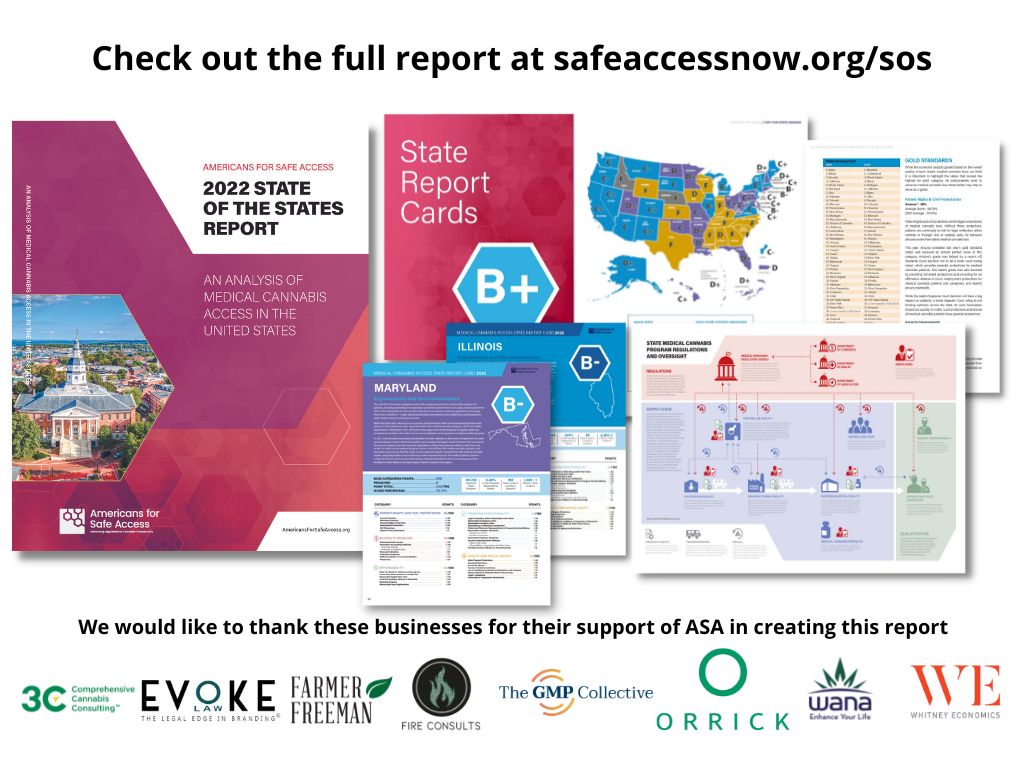The Good, The Bad, and the Disappointing: Takeaways of the 2022 State of the States Report

The Good, The Bad, and the Disappointing: Takeaways of the 2022 State of the States Report
Posted by Steph Sherer on February 08, 2023
After 25 years of the state cannabis policy experiments, there is no denying that the national acceptance of cannabis has changed. In a recent study published in the Journal of the American Medical Association, researchers found that one in three Americans are utilizing medical cannabis to manage chronic pain, all but two U.S. states and most of the territories have passed laws creating some form of access to cannabis products, and public support for medical cannabis remains at an all-time high.
State policymakers and regulators should be commended for taking on the task of serving their residents against federal intransigence, under threat and, at times, facing brutal enforcement undermining their efforts. While preparing this report, it was impossible to overlook the immense amount of work that patient advocates and state policy makers have undertaken to create these medical cannabis programs, and the daunting challenges still facing them.
Today, state policymakers and regulators are not only charged with creating a supply chain infrastructure that remains illegal at the federal level, but also balancing the requests of patients, cannabis businesses, and their constituents. In 2022 alone, 99 pieces of legislation were introduced to address a new health concern of the seemingly federally illegal, unregulated cannabinoid market.
Since 2014, Americans for Safe Access has been publishing the State of the States report as a tool for advocates and policy makers to understand and improve their medical cannabis program. Despite the astounding accomplishments of medical cannabis advocates over the last two decades, the sad fact remains that there is yet to be a single state medical cannabis program that meets the needs of all patients.
After combing through thousands of data points on the state programs, it is clear that, with a few exceptions, states that have added recreational/adult-use markets are forgetting the needs of patients. We also cannot overlook how much burden would be lifted off the states were the federal government to pass comprehensive medical cannabis federal legislation.
The Good
- States with robust medical cannabis programs are increasing
- Patient count continues to increase, 6 million patients nation-wide
- Cannabis Expungements – 23 states and counting
The Bad
- Patients are forgotten – adult use consumers taking priority
- Medical cannabis program improvements slowing sown or even regressing
- States prioritizing adult-use program improvements over medical cannabis program improvements
- Lack of supply for patients
The Disappointing
- Medical companies moving to rec
- Oversight of cannabis moving to alcohol regulators
- Tax breaks for patients not paying off
Conclusion
As we move forward to change federal cannabis policy, we must not forget the barriers patients still face. The average score among all states was only 46.16{8ddac68604e32d7f56d681d2010450ccff26ab27a6170b7c50c86645d71a668c}, demonstrating that there is still much more to be done to become a country where medical cannabis is available to all who need it. Federal coordination will do much to help patients, especially in areas where state governments continue to fail. But for now, all states, even (perhaps especially) those with adult-use laws, must prioritize patients and improve existing medical cannabis programs.
TAKE ACTION:
Every positive advancement towards changing medical cannabis laws has been a result of people like you, organizing and petitioning their legislators or contacting the media to provide them with accurate information regarding medical cannabis.
1) ASA has created a template email you can use to share the report with your lawmakers, let them know what their grade is and most importantly what that grade means to patients in your state. Please take a few minutes to ensure the impact of this report includes better programs in your state!
2) Forward ASA’s press release to local outlets or your favorite reporter or use our ASA’s template Letters to the Editor to share the report with your local papers to get safe access in the news!



